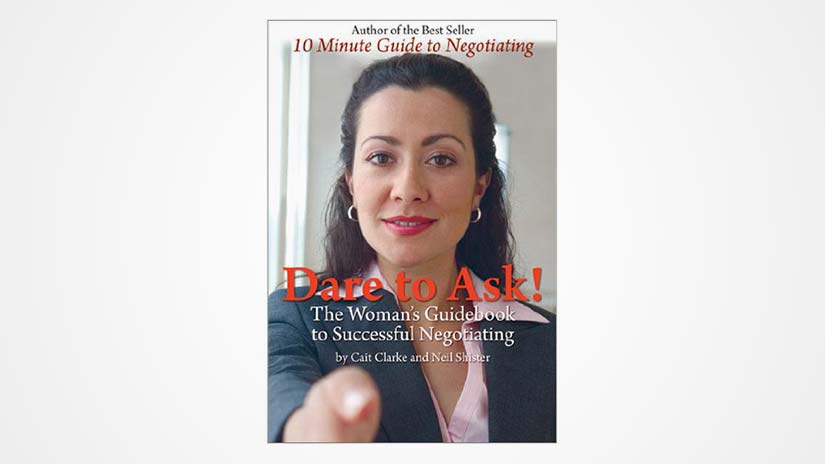
We feel smarter when talking. But studies show that people who listen more are usually considered to be smarter than people who talk a lot.

By Marianne Eby
Are women natural negotiators? Absolutely, but most of us don’t believe it. Watershed team members Cait Clarke and Neil Shister have written an exciting, easy to use negotiating guide directed to women called DARE TO ASK! THE WOMAN’S GUIDE TO SUCCESSFUL NEGOTIATING.
The book, the product of Cait’s extensive training and coaching, addresses the question of why so many women are reluctant to negotiate and then provides a powerful solution. Neil is the author of the bestseller Ten Minute Guide to Negotiating and has brought that same accessible style (complete with workbook exercises) to DARE TO ASK!
25 years ago Cait and I met in law school, where we were a studious pair who thought our career success would depend primarily on our skill development. We were right that skills matter, but we didn’t realize then that one of the most important skills we would need wasn’t being taught -- the skills of a master negotiator.
Since our early '80s law school days, academic experts repositioned negotiation as a win-win ‘collaborative conversation’ rather than ‘winner take all competitive conflict.’ In most situations, this collaborative strategy is the key to success, and thus is the focus of our work at Watershed.
Every year I teach collaborative negotiation to hundreds of business professionals and lawyers, many of them women. While I always encounter women who are strong negotiators, I’ve also found plenty of others reticent to engage in the give and take of a vibrant bargaining session. Cait and Neil’s new book helps us understand why that is, and helps women get in touch with their natural negotiator.
DARE TO ASK! offers women more than a skill set. The book helps us look at the upbringing, biology and other influences that have shaped us, and empowers us as women to rely on our innate talents for patience, listening, questioning, teamwork, empathy and social bonding – all critical bargaining skills. Where we women tend to fall short is that we are so natural at collaborative conversation, we don’t believe in it when the stakes are high and the outcome paramount – especially when we negotiate for ourselves!
Cait wants women to realize they start out with an edge in negotiations, not a deficit.
DARE TO ASK! combines theory with action steps and bargaining tips. It draws on academic and business school research, as well as popular authors who have written about how anti-feminine gender bias can put women at a disadvantage in traditional negotiating.
For example, the book discusses a landmark study of recent MBAs from elite business schools that found women’s starting salaries to be some 10% less than their male counterparts graduating from the same institutions. Why? Researchers traced the cause back to a one big factor: more women accepted the first offer made, and more men pushed back and asked for more.
To illustrate how pernicious this failure to negotiate becomes, this initial differential compounds over the years to represent almost half-a-million dollars of reduced earnings.
For these women and all those I teach who still hold back their inherent negotiation talents, DARE TO ASK! will ensure you move past that reluctance and enter negotiations with the skill and confidence to succeed. Explore Watershed’s program on Advancing Women Negotiators.

By Marianne Eby
Taking gender into consideration as one factor that may affect a person’s receptiveness to an offer is helpful, as long as you remember that broad categories don’t always work and many other factors affect a negotiator’s style besides gender. But yes, it may help to present your offer differently to a man than to a woman.
This question came up at one of our negotiation workshops recently, during a discussion about how different communication styles affect negotiations. A participant brought up a rule of thumb she’d read about gender considerations when asking for something:
If you’re asking something from a woman, start with small talk or a narrative that prepares her for your request. But if you’re asking a man, do the opposite – open with your request, and elaborate with context and detail afterwards.
Was this a good rule of thumb, and if so would it be useful in negotiation?
Let’s consider this rule in a simple negotiation. If you want to ask your neighbor to remove a tree that leans into your yard, and your neighbor is a woman, you would begin by talking about her garden, your garden, and what is thriving in your yards, before asking about the tree. If your neighbor is a man, on the other hand, such a rule of thumb suggests you start right off with the “ask” about the tree, and fill in the details next.
The participant was spot on. In fact, the last few years of research on the differences between male and female brains can help us. In the 2008 book Leadership and the Sexes: Using Gender to Create Success in Business, Barbara Annis and Michael Gurian describe the differences in male and female brains (there are over 100, and how understanding them can make or break effective communication in corporate culture).
The research tells us that as it turns out, many clichés about gender -- i.e., women are more emotional, men are less talkative -- are proven by PET and SPECT scans of our brains! Images of brain activity show that:
These differences have contributed to the different expectations women and men bring to communication, and to the clichés or cultural norms that have developed.
It’s easy to dismiss the chit-chat part of the approach to a woman as a waste of time. But it’s actually quite efficient, because women tend to get lots of clues during the chit chat. It’s not that the chit chat itself is so stimulating to them; what is stimulating is the wealth of information they gather from the chit chat about trust, comfort/discomfort, readiness to close, ect.
Men, on the other hand, tend to get fewer or no clues during such chit chat, so it makes sense that men find it stressful or wasteful: they find themselves processing what seems to be otherwise useless information.
Let’s say we approach Bob and say: "Hi Bob, how’s it going? I’ve got a question about this tree of yours that is causing me some concern.” For Bob, it is important to have a kind of frame or subject heading for the conversation before he can engage productively. Without that, the extra effort to establish “relational harmony” may be more verbiage and more detail than he wants to absorb at that moment. The chit chat would be inefficient and ineffective.
Let’s say we approach Sally and say: "Hi Sally, how’s it going? You really did get a nice deep blue in that hydrangea. How did you do it?....Your tulips were magnificent this year as well. Any tips for me?.....Now tell me about this tree….” For Sally, the entry dialogue is important: it establishes that they are friendly neighbors, with an interest in a win-win solution, which is her “frame” for a problem-solving negotiation about the tree.
Do these findings about the male and female brains change the way we negotiate in business? No and Yes.
No -- Establishing rapport and trust are critical parts of any negotiation, whether your counterpart is the same gender or not. And that rapport typically depends on a conversation which helps uncover shared interests.
And Yes – Style matters, and a master negotiator adopts strategies that will be most effective with the style of his/her counterpart. Establishing rapport is critical, but it doesn’t have to be the opener.
The real value of our workshop participant’s rule of thumb is that it gives us one simple tip to take with us on the road: plan your approach; sequence and timing matter.

By Marianne Eby
Women negotiate everyday – for others – for their team, for their company, for their clients, for their kids. But women have a much tougher time negotiating for themselves. Sheryl Sandberg, COO of Facebook and former top executive at Google, does all women a big favor when she acknowledges that even she was about to not negotiate Mark Zuckerberg’s first offer because it was a “generous offer.”
In the March 10, 2013 episode of “60 Minutes,” Sheryl Sandberg talks about her new book “Lean In: Women, Work and the Will to Lead”, her message for women to "lean in" rather than hold back, and her own missteps -- especially this big one -- when she almost didn’t negotiate on her own behalf. (See link here -- go to 5:56, or read the full script of the interview.)
Sandberg’s husband, David Goldberg, CEO of SurveyMonkey and a successful entrepreneur and technology executive in his own right, describes himself as “apoplectic” when Sandberg suggested to him that she would just accept Zuckerberg’s first offer because it was a “generous offer and I really want this job.” And then her brother-in-law jumped in and said “There is no man taking this job who would take the first offer.”
Sheryl Sandberg stepped back. She was spending more time assessing the extent of billionaire Mark Zuckerberg’s generosity than her own worth! Lucky for her, and for all women, Sandberg “leaned in” and negotiated her value.
Why is it so important that you not accept the other party’s first offer, no matter how good it is? Even when it is well beyond what you thought you would get? The answer comes from psychology 101 and its influence on the fundamentals of negotiating.
First, if you accept the other party’s first offer, they won’t feel like they got a good deal. Why? Because they will reflect on it and conclude that clearly they offered you too much or you wouldn’t have accepted it so readily! Think about it -- you ask for $10K for your used car that might fetch anywhere between $9K and $11K, and the interested buyer says YES! You, the seller, are happy, right? NO! The seller reflects on it and realizes that she could have gotten more for that car. But if the buyer discusses other price comparisons and offers $9,300, the seller will feel good to have gotten $9,700. And you want the other party to feel good about the deal, because then they aren’t trying to renege or get back what they lost in other ways.
Second, if the first offer is fair, or wonderful, or even better than you thought it would be, you still shouldn’t accept it. Maybe your assessment of worth was incorrect. Maybe your research wasn’t thorough, and you could get a lot more in the exchange. In our simple car example, maybe your car, like Sheryl Sandberg, isn’t a dime-a-dozen, and is worth more!
Third, the ending so quickly of negotiations curtailed any opportunity to find more value. Each of you may have been willing to address needs and concerns of the other in ways that would have ensured a smooth execution of the agreement. For example, with more discussion about that car you want to buy, you as the buyer might learn that the seller is willing to throw in the bike rack and take payment in 2 installments. The seller might find out that the buyer has 2 tickets to a great concert tonight that she can’t attend but that the seller would like to. With this discussion, you can both find trades that are hidden value. But when you accept a first offer, there is no more need for discussion, thus eliminating the opportunity to find value.
Fourth, first offers typically anchor us. First offers play a mind game with us by artificially setting the bar from which concessions can begin, thus weighing us down, like an anchor, to accept somebody else’s assessment of value. Never accept a first offer until you have gotten your own first offer on the table. Only make concessions from your first offer, not theirs, and only in exchange for value. (Read more on Who Opens First?)
(Read more on determining and presenting your Open Offer.)
Fifth, the other party expected to negotiate, and is disappointed. How would Mark Zuckerberg have felt if Sandberg had accepted his first offer? If the other party is a good negotiator, they will feel that an opportunity has been missed to create value. And if they are hiring you to negotiate for the company, but you have just demonstrated that you don’t negotiate for yourself (like Sheryl Sandberg almost did), you have lost respect and maybe more. In fact, if discussions end too quickly because you accepted the first offer, the other party may wonder if they failed to uncover a problem. Did you have something to hide?
At Watershed, we teach business women and men everyday how to negotiate in a way that is more likely to create value, lead to a successful negotiation, and a sustainable agreement. We speak to groups of seasoned professional women about using those same best practices on their own behalf. Women are strong negotiators for others. Listen to Sheryl Sandberg when she says women need to “lean in” and negotiate for themselves as well.

By Marianne Eby
Satya Nadella, Microsoft CEO, recently suggested that women should have faith in the “system” that will give them the right raise, rather than ask for a raise. He went further to call women superheroes for not asking. Nadella has since admitted that he was “completely wrong”. But in his mea culpa statement to Microsoft employees, Nadella got a few more things wrong, and that's where this blog begins.
In his original statement at the Grace Hopper Celebration of Women in Computing conference (GHC), Microsoft’s CEO, Satya Nadella, said that women shouldn’t ask for a raise; they should have “faith that the system will actually give you the right raise as you go along.” He went on to say that women who don’t ask for a raise have a “super power” in that they know how to use this “good karma” of not asking in order to get what they want.
Every good negotiator knows that you have to ask for what you want, and certainly there’s been a lot said (Bloomberg, CBC, Salon, et al.) about Nadella's live interview comments. We can take some comfort in the fact that Nadella's other stories, and his post fumble tweet, give us some indication that he too can have his eyes opened and learn from mistakes -- the mark of a good leader, and a good negotiator.
Nadella was being interviewed by Maria Klawe, a Microsoft Board Director and President of Harvey Mudd College, who was very professional and passionate in disagreeing with this man she respects so much:
"This is one of the very few things that I disagree with you on."
She gave some examples from her own career, and then said to the audience:
Here's my advice to all of you. First of all, do your homework. Make sure you actually know what a reasonable salary is."
Klawe also reminded women to role-play, or practice, the ask.
Klawe was right of course. And Nadella acknowledged that Klawe was right when he issued his written mea culpa to Microsoft employees:
“And when it comes to career advice on getting a raise when you think it’s deserved, Maria’s advice was the right advice. If you think you deserve a raise, you should just ask.”
I want to share a negotiator’s perspective regarding what Nadella said in this more prepared written mea culpa. I want to talk about whether "deserving" is sufficient, and if the best way to go is to "just ask."
Deserve v Worth
Should you ask for a raise because you think it’s “deserved?”
Not exactly. You should ask for a raise because you are worth it.
You can accuse me of splicing words, but maybe the words we use to describe why we want something are critical to getting it.
You may deserve more money for lots of reasons, but are you worth it?
Also, if you think in terms of deserve, you may talk yourself out of asking for a raise if you think the system is not able to adjust based on unique talent or results. For example, if you are working in a system that is stepped, like a training program, law firm associate, government jobs, or someone who recently got this year’s compensation increase and is not due another one for a year, you might hesitate to discuss what you “deserve.”
But if you think in terms of worth, you are more likely to initiate the conversation anyway, because a “worth” conversation leads to ideas – like higher profile assignments, other positions, switching geographic or subject areas, meetings with key leaders, etc. When possibilities emerge, you and your boss can find ways to compensate you for your worth.
Master negotiators leverage the worth v. deserve distinction all the time. Don’t pay us more, or provide a higher quality product, or meet a shorter deadline because our company deserves it after we took a hit on the last deal; instead master negotiators say (and demonstrate with legitimacy sources) -- give us more in this negotiation because our product or service is worth it. Now the counterpart feels psychologically motivated to give more.
“Just ask” v. Plan your approach strategically
“Just ask” rubs me the wrong way too. If you are worth more to the organization, more than likely you will have to show it, not “just ask.” And to do that effectively, Klawe was spot on when she said you have to do your homework.
There are 3 main considerations that should be part of your homework – People, Data and Plan B:
People Support
Data Support
Plan B
What’s your plan B or BATNA -- Best Alternative To a Negotiated Agreement? If this raise doesn’t work out, what are your next steps? Don’t wait. Network, share access and influence, help others. Test the market. Begin working on your plan B, or BATNA, now.
Remember...
Any “ask” is the beginning of a negotiation – a conversation about how to address your worth. To be a real superhero, don’t “Just Ask “– Plan strategically to ask for your worth! And all my fabulous male negotiator colleagues -- this applies to you too!
One absolute positive from Nadella’s comments is that the ensuing discussion is loud and hopefully has legs beyond the tech sector.
The tech industry has 30%/70% workforce split of women to men. And as reported in the New York Times, while female computer scientists are catching up and making 89 percent of what men in the same occupation make, other professions in the tech industry may not be so lucky. For finance professionals across professions, for example, women make only 66% of what men make. And across industries, another study showed that in 2013, women working full time earned only 78% of what similarly situated men earned.
Raising awareness about women lagging behind in salaries and leadership positions is always a good thing because it propels change. I always opt for controversy over silence; controversy sparks conversation, which can lead to solutions. Similarly in negotiation, controversy (you want x and I want y in exchange) drives conversation, and that conversation leads to solutions.
(Review information on Watershed's Advancing Women Negotiators workshop.)

By Marianne Eby
Two female power stories caught my woman negotiator’s eye this last month: The #LikeAGirl campaign gone viral after the US NFL's Super Bowl XLVIV, and Jessica Bennett’s Time Magazine article How Not to Be ‘Manterrupted’. It's a one-two punch and we negotiators can learn a lot from both.
It’s difficult NOT to jump on the bandwagon of a popular Twitter hashtag when it really speaks to you. I watch the Super Bowl every year, and always find new insights, although not about football. See my 2014 blog on Super Bowl XLVIII Cheerios commercial of a young daughter’s negotiation with her dad that put most negotiators to shame. Academics and practitioners alike know children are the best negotiators – ask for what they want, persistent questioners, super curious, unafraid of “No”, and armed with an infinite supply of creative solutions.
2015’s Super Bowl inspired the "girl" negotiator in me with Always #LikeAGirl campaign, turning on its head the centuries old negative connotation that goes with doing anything “like a girl.” (i.e., you throw like a girl...and a hundred others.)
Some of my favorite 2015 hashtags trending for #LikeAGirl
Hunt Taliban from the Air #LikeAGirl
Neuroscientist and Gene Therapist Jodi Mcbride: Perform neurosurgery #LikeAGirl
and of course
Watershed’s Negotiate #LikeAGirl
At Watershed, we train and coach amazing women negotiators at corporations around the world. We remind them that there are instincts and skills many women naturally possess that are the foundation for masterful negotiating – skills that we all (men and women) need to achieve Win-Win in our negotiations. We remind them to Negotiate #LikeAGirl:
Personal Story
About 10 years into my legal career, I interviewed for my dream job outside of law, and knew immediately after the interview that I didn’t get the job because I added not one stimulating insight to the conversation. I had some great ideas, but just couldn’t get them in without interrupting the very talkative Vice President who interviewed me. I was shocked when I got offered the job the next day. Months later while on the job, the EVP was singing my praises to the VP, and I overheard that VP tell his boss – “I was so impressed with our conversation when she interviewed that I knew she was perfect for the job!”
I had clearly honed listening to a whole new level. But regardless of my unfortunate (or fortunate) excessive listening, active listening is a skill that can and should be developed by everyone. For better or worse, women negotiators may have the upper hand if like me, they can make people feel heard (a concession received in itself) just by listening.
To use and not be used by these natural female tendencies, women negotiators should take heed:
Each gender has it’s inherent strengths and often those strengths can lead to weaknesses, like my allowing that VP to talk my entire interview. Or as Jessica Bennett, award winning writer, editor and producer illustrates -- allowing ourselves and our female colleagues to be "manterrupted” or have our ideas “bro-propriated.” We’ve all been interrupted at meetings and had others take credit for the ideas we pose – men and women alike – but ask your mothers, sisters, female bosses, wives and girl friends if they think it happens a lot more to them than the men in your life think it happens to them.
Bennett refers to the recent New York Times op-ed by Facebook COO Sheryl Sandberg and Wharton business school professor Adam Grant:
“When a woman speaks in a professional setting, she walks a tightrope. Either she’s barely heard or she’s judged as too aggressive. When a man says virtually the same thing, heads nod in appreciation of his fine idea.”
Bennett and her friends call this Manterrupting. Bennett proposes some great strategies, such as a imposing a general rule of no interruptions at meetings. She also proposes more targeted advice:
Each gender has strengths and weaknesses. But Negotiating is not male or female – it’s a conversation looking for creative ideas to expand value and lead to sustainable agreements. These conversations benefit from empathy, intuition, cooperation, listening, giving due credit for ideas, and not interrupting each other. So to all women and men negotiators, I say Negotiate #LikeAGirl!
Please provide us with some details and we will be in touch soon!